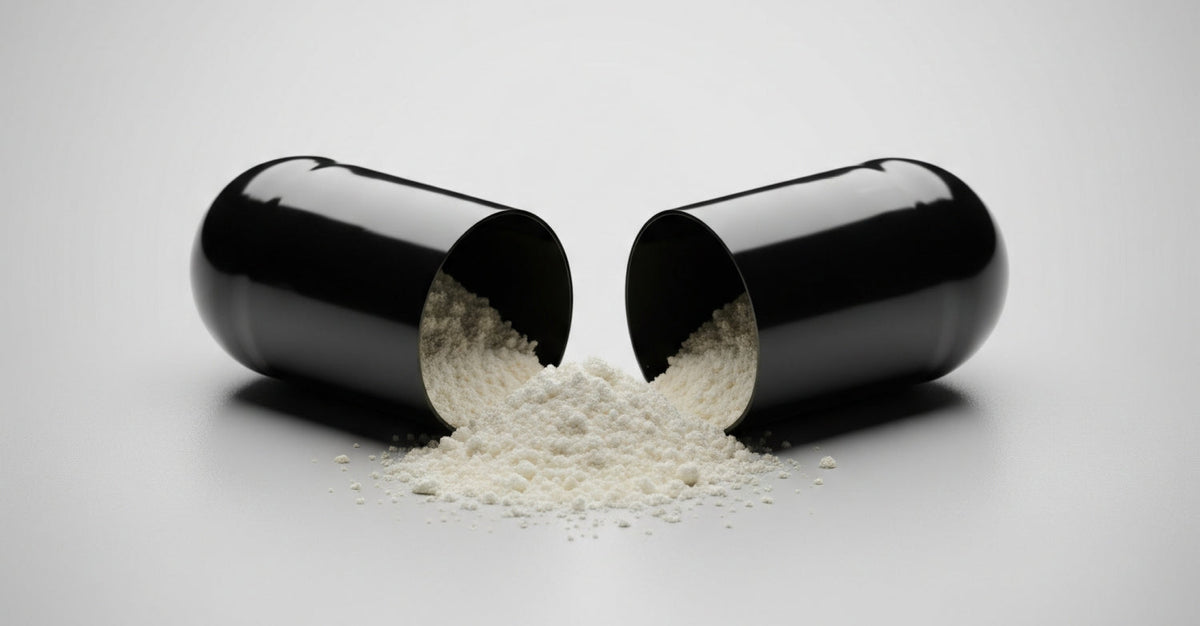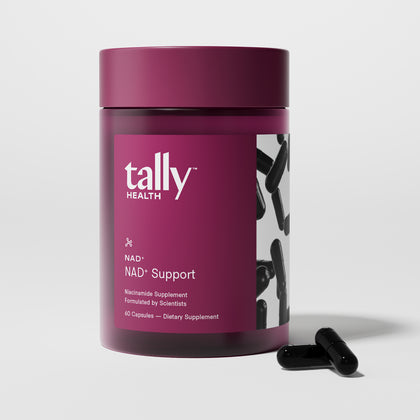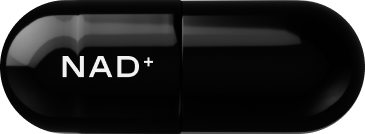

TL;DR: While there’s no official daily recommended intake for NAD+ precursors, research suggests that 1,000 mg of niacinamide per day —the amount found in Tally Health’s NAD+ supplement —is supported by science.
What Is NAD+ and Why Does It Matter?

Nicotinamide adenine dinucleotide (NAD+) is a critical coenzyme involved in cellular energy production , DNA repair , and metabolic regulation . NAD+ is involved in various cellular processes and biological processes, including energy production, DNA repair, and immune system function. NAD+ levels often decline with age, which may contribute to reduced mitochondrial function and age-related health conditions [1,2]. This decline is associated with cellular aging, cognitive problems, and metabolic disorders.
Supplementation with NAD+ precursors—such as niacinamide (NAM) , nicotinamide riboside (NR) , or nicotinamide mononucleotide (NMN) —has gained popularity for its potential to restore NAD+ levels and support healthy aging [3]. After mentioning mitochondrial function, it is important to highlight the importance of mitochondrial health and cellular homeostasis, and that maintaining cellular homeostasis is crucial for healthy aging. NAD+ supplementation has potential health benefits that extend beyond energy production, including promoting cellular health, supporting brain health, supporting neuronal health, and improving cognitive function and mental clarity. NAD+ is essential for cellular function, cellular health, and energy metabolism, and its utility extends to muscle function, physical performance, and body composition. NAD+ also plays a role in immune system function by supporting immune cells and cellular stress resistance, as underlying inflammatory conditions and chronic inflammation can increase NAD+ consumption. Chronic stress, environmental toxins, excessive alcohol consumption, and alcohol consumption can deplete NAD+ levels, and lifestyle factors and healthy lifestyle choices, such as a healthy diet rich in essential nutrients and regular physical activity, are important for maintaining NAD+ levels and supporting the body's natural processes.
Randomized controlled trials are ongoing to better understand the anti-aging benefits of NAD+ and its role in combatting age-related decline. NAD+ supports DNA repair mechanisms and is a key focus of research for promoting human health and overall health.
How Much NAD+ Should You Take Per Day?
There’s no official “NAD+ RDA,” but multiple human studies [4-8] offer guidance on effective dosage ranges for NAD+ precursors. The appropriate NAD+ dosage may depend on individual health status and should be discussed with a qualified healthcare professional or healthcare provider.

Most studies on NAD supplementation report few adverse effects, but it is important to consult healthcare providers or qualified healthcare professionals before starting NAD+ precursor supplementation to ensure safety and proper dosing. Current dosage recommendations are based on available clinical evidence, and more large-scale randomized controlled trials are needed to establish optimal dosing and long-term safety.
Why 1,000 mg of Niacinamide?

At 1,000 mg per day, Tally Health’s NAD+ supplement delivers a science-backed dose of niacinamide—without the flushing associated with high-dose niacin or the regulatory gray zone associated with NMN.
Recent studies show that:
Longer-term niacinamide use has been reported to be safe at doses under 3,000 mg/day [8].
Niacinamide avoids the “niacin flush” side effect common with nicotinic acid supplements.
NAM is well-recognized as an NAD+ precursor that can boost NAD+ levels via the salvage pathway. Specifically, NAM is converted into NMN, which is then converted into NAD+.
Most studies on NAD supplementation report minimal adverse effects at recommended doses, but individuals should be aware of potential adverse effects when taking NAD supplements and consult a healthcare professional before starting.
Furthermore, niacinamide is a well-characterized, FDA-recognized nutrient with a long track record of safe use in both supplements and food fortification. NAD+ supplementation is generally considered safe when following recommended guidelines.
NMN and the FDA: A Quick Note
While NMN is a popular NAD+ precursor, it was removed from the U.S. supplement market after the FDA determined it had previously been investigated as a pharmaceutical drug. As a result, NMN can no longer be sold as a dietary supplement in the U.S. unless further approvals are granted.
By contrast, Niacinamide remains fully compliant with U.S. FDA supplement regulations and is recognized as Generally Recognized as Safe (GRAS) for oral intake.
Final Takeaway: The Best NAD+ Dosage Per Day for Cellular Health

If you're seeking to boost your NAD+ levels , the evidence points to 1,000 mg/day of Niacinamide as an optimal dose. It’s:
Backed by human studies
Non-flushing
Well-tolerated long-term
Supported by U.S. FDA regulations
That’s exactly why Tally Health’s NAD+ formulation uses this precise dose.
What is NAD+ and why does it matter?
Nicotinamide adenine dinucleotide (NAD+) is a critical coenzyme involved in cellular energy production, DNA repair, and metabolic regulation. NAD+ levels often decline with age, which may contribute to reduced mitochondrial function and age-related health conditions.
How much niacinamide should you take per day to support NAD+ levels?
While there’s no official daily recommended intake, research suggests that 1,000 mg of niacinamide per day—the amount found in Tally Health’s NAD+ supplement—is supported by science and is within the effective dose range found in human studies (500–1,500 mg/day).
Why choose niacinamide over other NAD+ precursors like NMN or NR?
Niacinamide is a well-characterized, FDA-recognized nutrient that avoids the “niacin flush” side effect, remains compliant with U.S. regulations, and is generally considered safe. Unlike NMN, which has been removed from the U.S. supplement market, niacinamide is GRAS (Generally Recognized as Safe) and effective at boosting NAD+ levels via the salvage pathway.
Recommended Supplements
Citations
[1] Yoshino J, Baur JA, Imai S. NAD+ intermediates: the biology and therapeutic potential of NMN and NR. Cell Metab. 2018 Feb 6;27(2):513-528. doi:10.1016/j.cmet.2017.11.002. PMID: 29249687.
[2] Rajman L, Chwalek K, Sinclair DA. Therapeutic potential of NAD-boosting molecules: the in vivo evidence. Cell Metab. 2018 Mar 6;27(3):529-547. doi:10.1016/j.cmet.2018.02.011. PMID: 29514067.
[3] Lautrup S, et al. NAD+ in Brain Aging and Neurodegenerative Disorders. Cell Metab. 2019 Feb 5;29(2):630-655. doi:10.1016/j.cmet.2019.01.008. PMID: 30735634.
[4] Bogan KL, Brenner C. Nicotinic acid, niacinamide, and nicotinamide riboside: a molecular evaluation of NAD+ precursor vitamins in human nutrition. Annu Rev Nutr. 2008;28:115-130. doi:10.1146/annurev.nutr.28.061807.155443. PMID: 18429699.
[5] Elhassan YS, et al. Nicotinamide Riboside Augments the Aged Human Skeletal Muscle NAD+ Metabolome and Induces Transcriptomic and Anti-inflammatory Signatures. Cell Reports. 2019;28(7):1717–1728.e6. doi:10.1016/j.celrep.2019.07.043. PMID: 31412238.
[6] Martens CR, et al. Chronic nicotinamide riboside supplementation is well-tolerated and elevates NAD+ in healthy middle-aged and older adults. Nat Commun. 2018 Mar 29;9(1):1286. doi:10.1038/s41467-018-03421-7. PMID: 29593260.
[7] Irie J, et al. Effect of oral administration of nicotinamide mononucleotide on clinical parameters and nicotinamide metabolite levels in healthy Japanese men. Endocr J. 2020;67(2):153–160. doi:10.1507/endocrj.EJ19-0313. PMID: 31792986.
[8] Knip M, Douek IF, Moore WP, et al. Safety of high-dose nicotinamide: a review. Diabetologia. 2000;43(11):1337-1345. doi:10.1007/s001250051560. PMID: 11079727.











